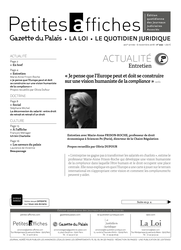The recent news
Nov. 25, 2018
Blog

Le demandeur à l'instance est une association : "nonhuman rights project". Le demandeur au litige est un éléphant. Il est exact qu'en droit processus qu'on peut distinguer le demandeur à l'instance et le demandeur au litige.
Le demandeur à l'instance parle pour le demandeur au litige demande la libéralisation de l'éléphant qui est enfermé seul dans le zoo de New-York sur le motif suivant : "« Happy est un être autonome qui a évolué pour parcourir au moins 20 km par jour en tant que membre d’un grand groupe social multi-générationnel », et qu'elle parcourt pour l'instant 1 pour cent de l'espace naturel que connaît son espèce, tandis qu'elle ne voit plus aucun autre membre de son espèce.
Le juge a été convaincu et a ordonné la libération de l'animal, pour qu'il retrouve un mode de vie correspondant à sa nature. Le juge le fait en application de l'habeas corpus , principe anglais et américain, qui interdit d'emprisonner toute personne sans justification. C'est une des principes les plus anciens et les plus fondamentaux du droit de Common Law pour protéger les personnes.
Il s'agira peut-être d'une libération pure et simple, puisque l'article raconte comment les personnes s'occupant des animaux dans ce zoo ont cherché à lui trouver d'autres éléphants pour lui tenir compagnie, mais cela fût un échec. Il s'agira peut-être de lui trouver un espace plus grand. Peut-être de la remettre dans la nature, d'où elle fût extraite lorsqu'elle était encore éléphanteau.
Ce n'est pas la décision qui est étonnante, car il y aurait sans doute beaucoup à dire sur la façon dont les animaux sont traités dans les zoos (comme dans les cirques).
Mais pour l'instant, pour se soucier de la façon dont les êtres humains traitent les animaux, le Droit, civil comme pénal) prend comme base l'interdiction de traitement cruels ou/et injustifiés. C'est-à-dire institue un devoir des personnes à l'égard des animaux sans pour autant instituer ceux-ci en personnes.
Ici, en appliquant l'habeas corpus, c'est-à-dire l'interdiction de priver de liberté sans raison les personnes, le juge décide de traiter l'animal comme une personne.
Et là, c'est briser la spécificité des êtres humains qui sont recouverts par le Droit du "masque' (en latin "persona") de la personnalité juridique, tandis que les autres réalités, comme les animaux ne le sont pas, ce qui implique que la personnalité, qui confère à son titulaire des droits subjectifs (comme le droit de propriété et un patrimoine - d'une façon obligatoire) et des obligations (sans qu'on puisse s'y dérouler) ne pouvait s'appliquer aux animaux ni aux choses.
La distinction des personnes et des choses est la distinction fondamentale en Droit.
Lorsque le Droit français a posé que les animaux sont des "êtres sensibles", il n'a pas pour autant remis en cause cette distinction, car c'est toujours le régime juridique des choses qui leur est applicable : c'est ainsi que l'on peut "donner" un chat ou un chat tandis que l'on ne peut pas "donner" un enfant. C'est donc toujours le régime juridique des biens qui est applicable aux animaux. Et l'on peut, voire l'on doit, protéger les animaux par d'autres façons que de les qualifier de "sujets de droit non-humains".
Car si l'on choisit cette voie-là, si l'on pose sur eux le "masque" de la personne, ici en leur appliquant l'habeas corpus qui interdit l'emprisonnement injustifié d'une personne, ils auront des avantages consubstantiellement liés à la personnalité, deviendront par exemple propriétaires, pourront hériter, pourront faire des contrats (par le biais d'avocats ou des associations qui les représenteront, etc., mais ils en auront aussi les inconvénients.
Revenant au Droit médiéval, lorsqu'ils tueront quelqu'un ils seront aptes à être sanctionnés et emprisonnés (avec certes l'habeas corpus pour les protéger).
Ainsi, la fin de l'Ancien Régime, l'on avait roué en place de Grève une truie pour avoir mangé un nouveau-né que la mère avait placé dans sa mangeoire le temps de faire le repas. La truie avait eu un procès et avait été condamné à mort.
Depuis, Beccaria avait demandé à ce qu'un Droit pénal s'instaure, qui ne confonde pas les personnes et les autres formes de vie, ne confonde pas les êtres humains, les animaux et les choses. Voltaire aussi l'avait demandé.
Nov. 23, 2018
Conferences

Référence générale : Frison-Roche, M.A., Les lanceurs d'alerte : glose, in Chacornac, J. (dir.), Les lanceurs d'alerte, Institut de droit comparé, 23 novembre 2018.
Lire le programme général de la manifestation.
Consulter les slides servant de support à la conférence.
Cette intervention introductive s'appuie sur un document de travail ; consulter le document de travail.
Actualisée et articulée au Document de travail, la conférence a servi de base à l'article de présentation générale de l'ouvrage Les lanceurs d'alerte : regards comparatifs , paru en mai 2020 sous la direction de Jérôme Chacornac, dans la collection du Centre de Législation comparée.
Nov. 15, 2018
Conferences

Référence:Frison-Roche, M.-A., Compliance Law beyond Competition Law in a sectorial perspectives, in 9th Annual Conference of International Forum on Business Ethical Conduct for the Aerospace and Defence Industry, Paris, 14 - 15 novembre 2018.
Cette conférence, faite en anglais, s'appuie sur un document de travail et des slides.
Nov. 9, 2018
Hearings by a Committee or Public organisation

► Référence complète : : M.-A. Frison-Roche, "La mise en place de la transformation des Commissaires-priseurs en Commissaires de justice à travers les principes du Droit de la Régulation et de la Compliance", audition devant la Commission présidée par Maître Edouard de Lamaze, Ministère de la Justice, 9 novembre 2018.
____
La mission à propos de laquelle l'audition se déroule porte sur l'avenir de la profession d'opérateurs de ventes volontaires.
La présentation à partir de laquelle cette audition se déroule s'opère à partir d'un document de travail : lire le document de travail.

Nov. 8, 2018
Publications

► Référence complète : M.-A. Frison-Roche, La conception de la mise en place de la transformation des Commissaires-priseurs en Opérateurs des ventes volontaires à travers les principes du Droit de la Régulation et de la Compliance, document de travail, novembre 2018.
____
Ce document de travail est le sous-jacent de l'audition du 9 novembre 2018 devant une mission menée au Ministère de la Justice sur l'avenir des opérateurs de ventes volontaires.
____
► Résumé du document de travail : Il s'agit de montrer en premier lieu que la pratique professionnelle des commissaires-priseurs doit être appréhendée par le Droit de Régulation, puisque celui-ci a pour objet de construire et de maintenir dans le temps un équilibre instable entre le principe de concurrence (car il s'agit d'une activité marchande) et d'autres soucis (car il s'agit d'enjeux de patrimoines nationaux, d'histoire, de beau). Puis de montrer dans un second temps que ce soin d'un tel équilibre, qui aboutit à une notion de "place", doit être internalisé dans les maisons elles-mêmes : c'est l'objet du Droit de la Compliance, qui prolonge le Droit de la Régulation. C'est pourquoi le Conseil des Ventes volontaires doit lui-même se penser comme une Autorité de Supervision (sur le modèle bancaire).
____
🔓lire le document de travail ci-dessous ⤵️
Nov. 7, 2018
Publications

►Référence complète : M.-A. Frison-Roche, M.-A., "Le système juridique français constitue-t-il un atout ou un handicap pour nos entreprises et nos territoires ?" in M. Pébereau, M. (dir.), Réformes et transformations, PUF, 2018.
____
Résumé de l'article : La formulation de la question posée est comme une fermeture de tout débat, posant implicitement que le Droit devrait servir l'Économie et le servir "bien" (atout) plutôt que "mal" (handicap), alors qu'il faudrait s'accorder sur une méthode consistant pour chaque discipline à l'œuvre à ne prendre l'ascendant sur l'autre (I). Ce jugement doit être global, porter sur le droit en tant qu'il est un système. Quand on lit les différents travaux, ils ne portent que sur tel ou tel mécanisme, au mieux sur tel ou tel branche du Droit, ce qui méconnaît le fait que le Droit français est un système (II). C'est pourtant bien qu'en tant qu'il est un système que le Droit français doit être saisi, l’appréhender non seulement par ses signaux forts, mais aussi par ses signaux faibles Ceux-ci peuvent constituer les atouts les plus précieux (III). Plus encore, il est fructueux de donner plein effet à ce terme si particulier et peu souvent valorisé qu’est le terme de « territoire », placé dans la question, terme si ancien et aujourd'hui si intriguant puisque de "nouveaux territoires" s'offrent à nous : le digital, l’Europe. Et là, le système juridique français, que peut-il apporter, portant alors ce que l’on pourrait appeler la gloire française, car le Droit est comme le Politique une discipline qui porte des « prétentions », par exemple celle de construire l’Europe, par exemple l’Europe digitale (IV).
____
____
🚧Lire le document de travail ayant servi de base à l'article.
________
Nov. 6, 2018
Interviews

Référence complète : Frison-Roche M.-A., « Je pense que l'Europe peut et doit se construire sur une vision humaniste de la compliance », entretien avec Olivia Dufour, in Les Petites Affiches, n°222, novembre 2018, pp.4-7.
Cet entretien a été réalisé par Olivia Dufour, à la suite de deux conférences, la première réalisée au Collège de France sur la question de la convergence du Droit et de l'Economie dans la construction de l'Europe de la Compliance (4 octobre 2018), la seconde réalisée lors de la première journée des RegTechs de Paris (9 octobre 2018).
Résumé par le Journal :
« L’entreprise ne gagne pas à transformer les salariés en charlots », estime le professeur Marie-Anne Frison-Roche qui développe une vision humaniste de la compliance dans laquelle l’être humain et le droit occupent une place centrale. Elle nous explique en quoi l’Europe a une carte à jouer sur le terrain international en s’appropriant cette vision et comment les compliancetechs peuvent y aider.
Nov. 5, 2018
Thesaurus : Doctrine
Référence complète : The Chilling Effect of Governance-by-data on Innovation Niva Elkin-Koren* and Michal S. Gal, University of Chicago Law Review (2018)
Lire le document de travail servant de base à l'article publié dans University of Chicago Law Review, 2018.